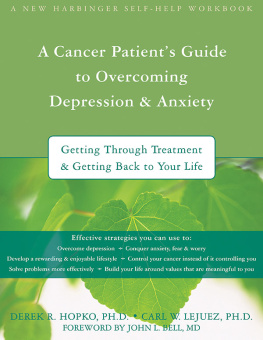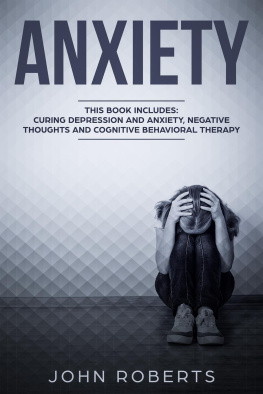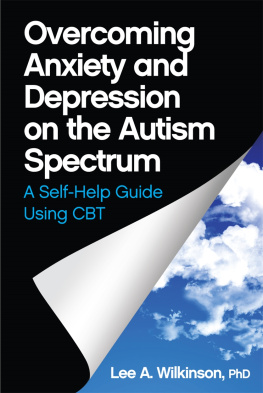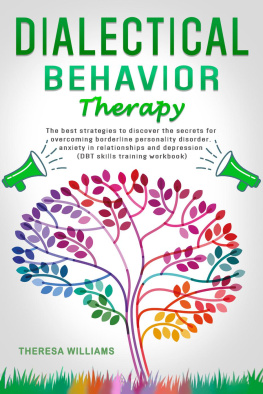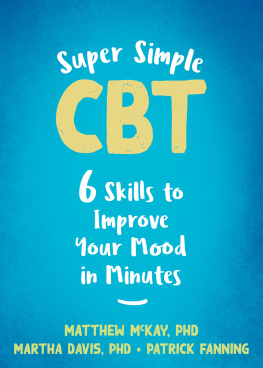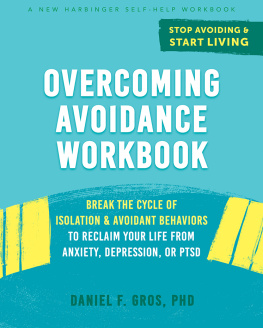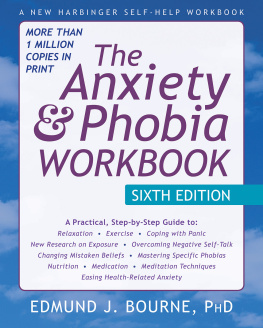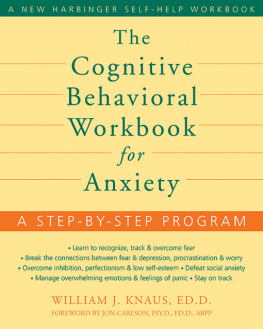Lejuez Carl - Cancer Patients Guide to Overcoming Depression and Anxiety
Here you can read online Lejuez Carl - Cancer Patients Guide to Overcoming Depression and Anxiety full text of the book (entire story) in english for free. Download pdf and epub, get meaning, cover and reviews about this ebook. year: 2008, publisher: New Harbinger Publications, genre: Home and family. Description of the work, (preface) as well as reviews are available. Best literature library LitArk.com created for fans of good reading and offers a wide selection of genres:
Romance novel
Science fiction
Adventure
Detective
Science
History
Home and family
Prose
Art
Politics
Computer
Non-fiction
Religion
Business
Children
Humor
Choose a favorite category and find really read worthwhile books. Enjoy immersion in the world of imagination, feel the emotions of the characters or learn something new for yourself, make an fascinating discovery.
- Book:Cancer Patients Guide to Overcoming Depression and Anxiety
- Author:
- Publisher:New Harbinger Publications
- Genre:
- Year:2008
- Rating:3 / 5
- Favourites:Add to favourites
- Your mark:
- 60
- 1
- 2
- 3
- 4
- 5
Cancer Patients Guide to Overcoming Depression and Anxiety: summary, description and annotation
We offer to read an annotation, description, summary or preface (depends on what the author of the book "Cancer Patients Guide to Overcoming Depression and Anxiety" wrote himself). If you haven't found the necessary information about the book — write in the comments, we will try to find it.
Lejuez Carl: author's other books
Who wrote Cancer Patients Guide to Overcoming Depression and Anxiety? Find out the surname, the name of the author of the book and a list of all author's works by series.
Cancer Patients Guide to Overcoming Depression and Anxiety — read online for free the complete book (whole text) full work
Below is the text of the book, divided by pages. System saving the place of the last page read, allows you to conveniently read the book "Cancer Patients Guide to Overcoming Depression and Anxiety" online for free, without having to search again every time where you left off. Put a bookmark, and you can go to the page where you finished reading at any time.
Font size:
Interval:
Bookmark:
Development of this workbook would not have been possible without the efforts of many people. In particular, we are grateful for the work of behavioral activation researchers who are tirelessly working toward developing improved behavioral treatments for depression, anxiety, and psychological distress associated with various medical problems. Included in this list are Michael Addis, Stacey Daughters, Sona Dimidjian, Keith Dobson, David Dunner, Jackie Gollan, Steven Hollon, Mathew Jakupak, Peter Lewinsohn, Christopher Martell, Patrick Mulick, Amy Naugle, Jeffrey Porter, Adria Trotman, and the late Neil Jacobson.
No program of treatment outcome research would be manageable without the efforts of bright and highly motivated graduate students. Thank you to the graduate students who have been a part of our program of research, including Maria Armento, Marina Bornovalova, John Carvalho, Lindsey Colman, Michelle Duplinsky, Melissa Hunt, Samantha Levine, Christen Mullane, and Sarah Robertson.
We also wish to thank the National Institute of Mental Health, the National Cancer Institute, and the Susan G. Komen Breast Cancer Foundation for their support of our research.
Finally, we would like to express our appreciation for the contributions made by all individuals from New Harbinger Publications who participated in the development of this workbook.
Derek R. Hopko, Ph.D., is associate professor and associate department head in the Department of Psychology at the University of Tennessee. He graduated from West Virginia University and completed his residency and postdoctoral training at the University of Texas Medical School. His research and clinical interests focus on the behavioral assessment and treatment of mood and anxiety disorders. Hopko has strong interests in health psychology and conducts behavioral treatment outcome research with cancer patients diagnosed with clinical depression. He is a recipient of grant funding from the National Institute of Mental Health, the National Cancer Institute, and the Susan G. Komen Breast Cancer Foundation. He has authored some seventy peer-reviewed publications and serves on the editorial board of six journals.
Carl W. Lejuez, Ph.D., is associate professor in the Department of Psychology and founding director of the Center for Addictions, Personality, and Emotion Research (CAPER) at the University of Maryland. He graduated from West Virginia University and completed his clinical internship at Brown Medical School. Lejuezs current clinical and research interests focus on the treatment of mood and addictive disorders. He has published more than ninety-five articles and book chapters, served as principal investigator for more than ten grants from the National Institute of Drug Abuse, and has received Young Investigator Awards from the American Psychological Association Division of Experimental Psychology (Applied) and the Association for
Behavioral and Cognitive Therapies (ABCT).
Foreword writer John L. Bell, MD, is professor of surgery and chief of the Division of Surgical Oncology at the University of Tennessee Graduate School of Medicine and director of the University of Tennessee Cancer Institute.
CHAPTER 1
If you are reading this book, chances are that you may already know a great deal about cancer and how it works. However, there are also a significant number of cancer patients who make the decision to avoid learning about and thinking about their diagnosis. As this book progresses, we will address more specifically the concept of avoidance, that is, avoiding certain behaviors or thoughts, and why the human tendency to avoid can create problems. For the time being, realize that we are going to take a different path toward overcoming your anxiety and depression by approaching certain circumstances and behaviors, a process we will refer to as activation.
It is this mindset that will enable you to move forward in your life and to learn skills that will better allow you to cope with whatever difficult circumstances life throws in your direction. To head down this path of becoming activated, lets begin with the process of understanding the diagnosis of cancer. Well include a time estimate for working through each chapter.
Time: Approximately One Week
Although it may create some initial anxiety to read about cancer, the knowledge you gain may allow you to put things into a more helpful perspective and may prevent you from making faulty assumptions about yourself and your future. It may even help you and your loved ones to lead a healthier lifestyle, reducing the risk that your cancer will reoccur (if you are in remission). You may even find that some of your biggest fears are based more on a fear of the worst happening than on what is actually most likely to occur.
Even if you discover that some of your most significant fears or concerns are in fact justified or accurate, this experience may not be necessarily bad or undesirable. Instead, this will simply mean that you have become more educated about cancer. You can then process this new information and determine whether it changes how you view yourself, your values, and how you behaveand whether changes are needed in your life. If changes are desired, this self-help workbook will provide the assistance. So now, lets discuss cancer.
Statistics
Cancer is not an uncommon medical diagnosis. Men and women, people from various ethnic and cultural backgrounds, and people of all ages are susceptible to developing cancer during the course of their lifetime. The American Cancer Society (2005) has printed the following information that helps highlight the impact of cancer in our society:
- The National Cancer Institute estimates that approximately ten million individuals with cancer are alive in the United States.
- Each year, approximately 1 to 1.5 million new cancer cases are diagnosed.
- Men may be at a slightly higher vulnerability to develop cancer.
- Over a lifetime, about 45 percent of all males will develop cancer.
- Over a lifetime, about 38 percent of all females will develop cancer.
- The most common form of cancer in men is prostate cancer.
- The most common form of cancer in women is breast cancer.
- For both genders, lung, colorectal, and skin cancers are the next most common types of cancer.
- Cancer is the second leading cause of death in the United States, exceeded only by heart disease.
- The five-year survival rate for all cancers combined is 62 percent.
Cell Growth
Cells are the basic structural units that are essential to all living things. Each of us has trillions of cells in our bodies that allow us to function in different ways. These cells allow for breathing, digesting food, thinking, talking, walking, and many other human behaviors. Normal healthy cells generally perform all of these functions. These normal cells have the ability to reproduce themselves by dividing, a process referred to as mitosis. One cell will become two, two will become four, and so the story goes. This division of normal and healthy cells occurs in a regulated manner.
Throughout the body, cells continually divide and form new cells to supply the material for growth or to replace worn-out or injured cells. For example, when you cut your finger, certain cells divide rapidly until the tissue is healed and the skin is repaired. They will then go back to their normal rate of division. However, some cells may stop functioning or behaving as they should, may serve no useful purpose in the body, and may become cancerous or malignant. Cancer cells divide in a haphazard manner that is very different from the normal process. Scientists have recently made great advances toward understanding the different pathways that cells may use to become cancerous that involve different genetic alterations. Some genetic changes result in:
Font size:
Interval:
Bookmark:
Similar books «Cancer Patients Guide to Overcoming Depression and Anxiety»
Look at similar books to Cancer Patients Guide to Overcoming Depression and Anxiety. We have selected literature similar in name and meaning in the hope of providing readers with more options to find new, interesting, not yet read works.
Discussion, reviews of the book Cancer Patients Guide to Overcoming Depression and Anxiety and just readers' own opinions. Leave your comments, write what you think about the work, its meaning or the main characters. Specify what exactly you liked and what you didn't like, and why you think so.

